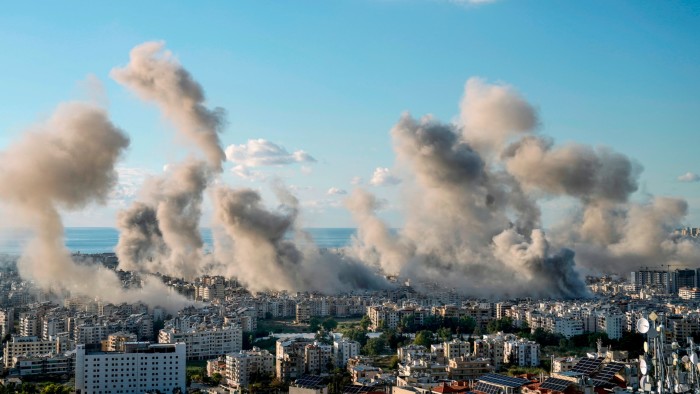Unlock the Editor’s Digest for free
Roula Khalaf, Editor of the FT, selects her favourite stories in this weekly newsletter.
Israel launched a wave of air strikes on the Lebanese capital on Tuesday, pounding what it said were 20 targets in Beirut as Prime Minister Benjamin Netanyahu’s security cabinet was due to vote on a potential ceasefire deal with Hizbollah.
Israeli forces launched a strike that destroyed a building in the densely populated central Beirut neighbourhood of Noueiri without warning, killing at least three people and injuring 26, Lebanese health authorities said.
Israeli warplanes hit the 20 targets in the Lebanese capital within the span of two minutes, the Israel Defense Forces said, claiming the targets — many of them in the southern suburbs — included Hizbollah “money warehouses”, artillery storage and “command headquarters”.
Following the strikes on Beirut, the IDF said it would soon attack “many branches” of the Hizbollah lender al-Qard al-Hassan Association across Lebanon. It also bombarded Lebanon’s south and eastern Bekaa Valley on Tuesday.
The escalation came in the final moments before Netanyahu’s security cabinet was due to convene to vote on the US-brokered potential ceasefire deal involving an initial 60-day truce, which could pave the way for an end to more than a year of hostilities with the Lebanese militant group.
John Kirby, spokesperson for the US National Security Council, said on Monday an agreement was “close”.
Israel’s far-right national security minister and the mayors of several northern towns have lashed out at the plan, however. Itamar Ben-Gvir told Israeli public radio the country should continue its assault on Hizbollah.
“It will be a historical missed opportunity if we stop everything and go backwards,” the minister said.
His criticism was echoed by the mayors of several towns in northern Israel, which has borne the brunt of Hizbollah’s rocket launches over the past year. David Azoulay, mayor of Metula, called the proposal “shameful” and “an agreement of surrender . . . to Hizbollah, an arm of Iran”.
Avichai Stern, mayor of Kiryat Shmona, called the deal a “total capitulation”.
“We managed to bring down Hizbollah but instead of continuing to crush them into dust we are giving them a burst of oxygen and bringing them back to life,” he told the Israel Hayom newspaper. “It seems to me that someone here has gone crazy.”
The proposed agreement envisages a 60-day truce during which Israeli forces would withdraw from Lebanon, and Hizbollah would move its weapons north of the Litani river, which runs 30km from the border between Israel and Lebanon.
The Lebanese Armed Forces, with support from the UN peacekeeping body Unifil, would take control of the areas in southern Lebanon vacated by Israeli troops and Hizbollah fighters. If the truce holds, Israel and Lebanon would then work to resolve disputes over their contested border.
Amid the criticism, an Israeli official said the country was “agreeing to a ceasefire in Lebanon, not to the end of the war”, comparing the potential deal to a brief truce in Gaza between Israel and Hamas last year that was followed by a resumption of fighting.
“We will test the ceasefire in the field, and act accordingly. Even in the ceasefire in Gaza, it was claimed that Israel would not return to fighting, [but] it returned — and in a big way . . . in the face of tremendous international pressure,” the official said.
“The security approach has changed — Israel will respond in Lebanon against any threat, which has not happened in the last 20 years in Lebanon.”
Diplomats hope the deal will bring an end to one of the bloodiest rounds of fighting in the decades-old conflict between Israel and the Iran-backed militant group, with more than 3,700 Lebanese and more than 120 Israelis killed over the past year.
The hostilities began when Hizbollah began firing rockets at Israel in solidarity with Hamas in the days after the Palestinian militant group’s October 7 2023 attack on Israel.
For almost a year, they were largely confined to exchanges of fire in a narrow strip of land either side of the Blue Line, the UN-demarcated border between the two countries. But in recent months they have escalated into a full-blown war, with Israel carrying out a ferocious aerial bombardment of targets across Lebanon and launching a ground invasion in early October.
Fighting has intensified in recent days in parallel with the negotiations. Israel’s military said on Tuesday that its forces carried out raids “in the area of the Litani”. Hizbollah has also stepped up attacks, with the militant group launching more than 250 rockets and missiles at Israel on Sunday.
Read the full article here




